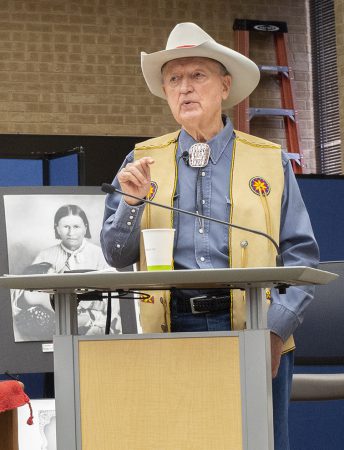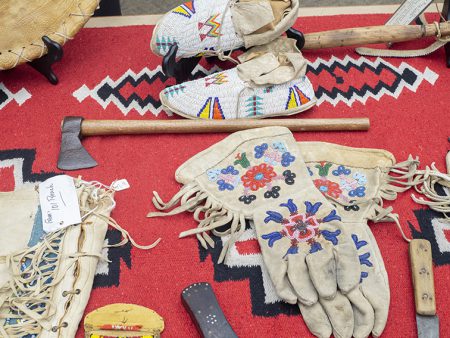| November 13, 2019 | Juan Ibarra | editor-in-chief |
|---|

The lives of the last chief of the Comanche nation, Quanah Parker, and his mother, Cynthia Ann Parker, were presented as a part of Native American heritage month.
The Tarrant County Historical Commission hosted this presentation in conjunction with the NE library and historical commission member Douglas Harman served as its master of ceremonies.
Harman began the presentation with background on the Native American population and how they grew from being a force to be reckoned with to being slowly outpaced by technology and the events that led to the kidnapping of Cynthia Ann Parker.
Fort Parker was established in 1836, and a few young Comanche men were looking for a way to establish themselves, so they raided the fort and kidnapped five children, one being 9-year-old Cynthia Ann Parker.
Excluding Parker, some of the five children who were kidnapped ended up being bartered for and returned to their families. Several of those who had been abducted wrote books about their experiences as captives.
“You think of all the things that stir up excitement in today’s society, and well, the books about captivity stirred up that same excitement and interest at that point in time,” Harman said.
Cynthia Ann Parker was eventually taken back and returned to her original society. However, it was not the same as the Comanche life she once knew and lived out her life until her death in 1871.
Harman then shifted focus to the life of Cynthia Ann Parker’s son Quanah Parker, as well as the treatment of Native Americans by the U.S. government.
“Many of them fought in World War I and World War II, and still many of them were not citizens of the United States,” Harman said.
The liquor policies were also a source of pain to the Native American community, according to Harman.
“You have a group of people depressed enough to be in a reservation, and then you have the government allowing liquor to be sold to them and so the problem with Native Americans and liquor just got aggravated,” Harman said.
One of the reasons why the story of the mother and son is so important to Harman is because it can be viewed from a historical or a psychological context.
“There were so many other things happening during this era, but this one is so well documented that many books have been written about it,” he said.
Harman said he enjoys being in the Tarrant County Historical Commission and thinks understanding history helps to provide context to modern-day society.
“Understanding history is one of those fundamental things you need to know, and that is how I have always approached it,” he said.
NE library director Mark Dolive said he has a background in history, so he always enjoys inviting speakers who can teach students a bit more about the past.
“I’ve been here for the last eight years, and I have always been wanting to make the library more than just a collection of books,” Dolive said.
NE student Angelica Torres said she likes learning more about history she never had a chance to learn in grade school.
“I don’t know a whole lot about Native American history,” Torres said. “I’m studying U.S. history now, so it is nice to it put into context.”





























